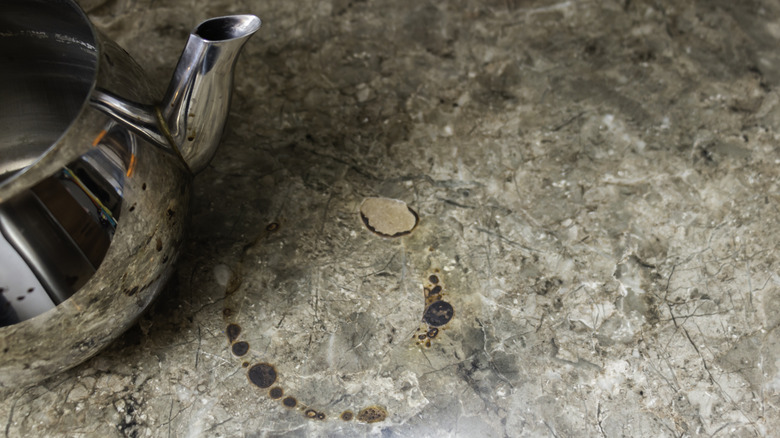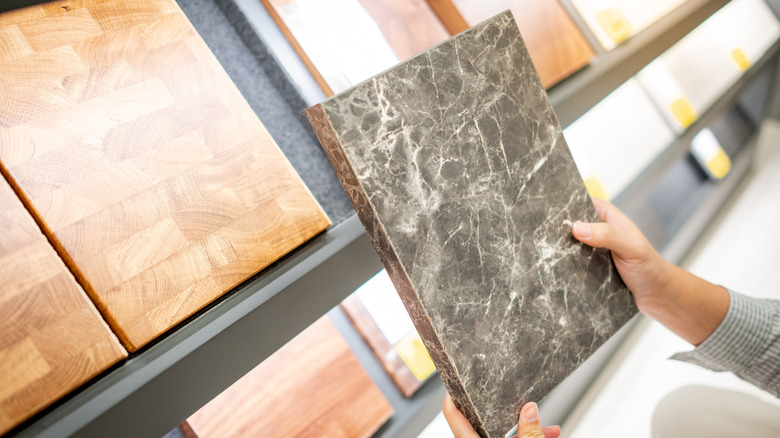The Low-Cost Countertop You Should Consider Replacing Before You Sell Your House
One of the best times to modernize your home is when you're preparing to sell it, as doing so correctly can increase the resale value of your home while helping draw more eyes to your property once it's on the market. And with the kitchen being one of the most profitable rooms in the house when it comes to ROI, prioritizing this space when planning for a makeover can help you reap the greatest reward once renovations are complete.
Laminate is by far one of the cheapest countertop materials you can find for a kitchen, with even the average cost of the most expensive varieties sitting at less than $100 per square foot. While laminate counters might seem like a smart choice initially for homeowners on a budget, you may realize fairly quickly why they're priced so affordably compared to other options. Definitely consider replacing the laminate countertops in your home before putting your house on the market, since they tend to offer a poor return on your investment.
First gaining popularity in the mid-20th century, laminate countertops are developed from sheets of kraft paper soaked in resins before being pressed together and plastered onto a particleboard core. Although they come with some advantages, like being easy to install for DIY enthusiasts, laminate counters are still deemed unappealing by the majority of modern-day house hunters, who usually prefer stronger, more luxurious styles instead.
Disadvantages of owning laminate countertops
A major downside to having laminate countertops is that they have a much shorter lifespan compared to other, more expensive countertop materials on the market. Laminate is quicker to fade, wear away, and show signs of distress when met with certain elements on a regular basis. For example, these counters offer little resistance to heat, water, and harsh chemicals and scratch fairly easily, making them a poor addition to a kitchen if looking for longevity in a countertop style.
To make matters worse, laminate is also difficult to repair after it's been cracked or suffered water damage. Unlike some natural stone countertops that can be resurfaced after bearing imperfections along their surfaces, laminate countertops are hard to restore to their original condition once they've been exposed to excessive deterioration. In fact, it may be more reasonable to replace the affected countertop entirely than to try to salvage what is left.
Also since laminate countertops cost so little, to begin with, expect very little monetary return, if any, when it comes time to sell your home. The material is so affordable and widely accessible that it'll barely influence your house's property value after it's installed. The design choice may also turn away some initially interested buyers entirely, who might not want to invest time and energy into renovating the kitchen after closing on a home.
Worthy countertop alternatives to install instead
Getting rid of your old or damaged laminate counters is a valid decision to make when updating your home, but what's the best material to replace them with? Well, that depends on the kind of qualities you look for in a countertop, your personal aesthetic preference, and how much you're willing to spend on an upgrade.
Countertops derived from natural stone — like granite, limestone, and quartzite — are popular choices among modern-day homebuyers, admired for their timeless feel and versatility. These counters are much stronger and longer-lasting than laminate when properly cared for, with select styles capable of lasting more than 100 years. As a result, stone counters are also some of the most expensive you'll find on the market, typically ranging between $1,500 and $6,000 on average to install. But this hefty price tag is often accompanied by a lofty return on investment. Homeowners should expect to see their resale values increase by roughly three times the total cost paid to replace their old countertops.
Wooden countertops are a slightly cheaper alternative for homeowners' consideration, as they offer durability and longevity that are also superior to laminate, paired with a warm, earthy aesthetic. Butcher block countertops, for example, one of the main types of wooden countertops, are advantageous to homeowners because they're sustainable, customizable, and come with anti-bacterial properties. However, wood countertops normally call for a bit more effort to maintain than stone options. They're also more susceptible to dings and scratches.


